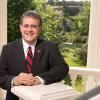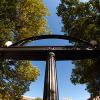Michael Adams Has a Few Things He'd Like to Get Off His Chest
UGA President Michael Adams just wrapped up his last State of the University address before he retires in June, and he didn't waste the opportunity, taking aim at UGA football fanaticism and expressing mixed feelings about the Athens community during an hour-long speech.
Adams lauded Athens' tolerant atmosphere and noted that UGA and Athens-Clarke County have worked together on a number of ways, including on the Athens Transit, the North Oconee River Greenway, the sewer plant off College Station Road and the performing arts. But he criticized the community for expecting too much financially from a state-supported, nonprofit institution with more limited resources than ever.
"The old and oft-repeated saws about how much land UGA owns and how much UGA doesn't pay in taxes are not only shortsighted, they are potentially harmful to our state support base," he said. "They contribute to a negative feeling in Atlanta, not widely shared by our funding partners, who still believe that sending some $400 million of taxpayer money every year to Athens is a pretty strong level of commitment."
He declined to elaborate. "Let the speech speak for itself," he said afterward.
The man who nearly got fired for forcing Vince Dooley into retirement warned against putting athletics ahead of academics, going so far as to reference coach/child molester Jerry Sandusky.
"Academic interests must remain in charge both the academic and athletic enterprises," he said. "Let me say that again: The academic establishment has to control the athletic establishment, not the other way around. Last year's troubling news out of Penn State made that quite clear."
Adams said he has "worked hard to improve the balance" between academics and athletics, but it's "a constant battle" made more difficult by national media (read: ESPN) that increasingly dominate college sports.
To that end, Adams advocated adding seats to the east end zone of Sanford Stadium but leaving the west end open, allowing fans a view of academic buildings like the Miller Learning Center and reinforcing the idea that football is "part of the whole, not an entity onto itself."
"I will come back and haunt the president and athletic director who close the west end of the stadium," he said.
Adams spent much of the speech burnishing his own legacy: Incoming students are more accomplished, fundraising is up, researchers are getting more grants and UGA has climbed in the rankings since he took over 16 years ago.
"We have more serious students with stronger faculty in improved facilities," he said.
During his tenure, Adams noted, UGA has built the Richard B. Russell Special Collections Libraries, Lamar Dodd School of Arts; Georgia Museum of Art, MLC, Coverdell Center, pharmacy complex and Complex Carbohydrate Research Center; renovated the Fine Arts Building, Old College, New College, Moore College, Phi Kappa, Candler Hall and Administration Building; broken ground on a new veterinary teaching hospital, Terry College of Business building and Bolton Dining Hall, started the School of Public and International Affairs, College of Environment and Design, College of Public Health, Odum School of Ecology and College of Engineering, opened a new Normaltown campus and expanded the fine arts and marine science programs.
Adams listed a number of things left undone, as well. He recommended expanding medical and public health education to deal with the obesity "crisis," creating a College of FIne Arts, a new dance and drama building on East Campus, an expanded College of Marine Science to tackle "critical" coastal and water issues, a renewed emphasis on graduate studies with a new grad student center on Lumpkin Street.
But he questioned whether his successor will have time to accomplish those goals. While UGA has had four presidents since World War II, the average tenure is now just six to eight years.
"The great public universities of our day are much larger; very, very large, complex ships, resistant to change and, alas, more bureaucratic than ever," he said.
In closing, Adams defended himself against critics, comparing himself to a tenacious bulldog and dusting off the old saw about making omelets and cracking eggs. One of the dozens of people he thanked was Sgt. Allan Hatcher, the university police officer who drives him to Atlanta.
"...(He) has kept anyone from shooting me the past 16 years," Adams said. "Perhaps, at times, a few people have entertained that thought. Unfortunately, a few people really have."












comments